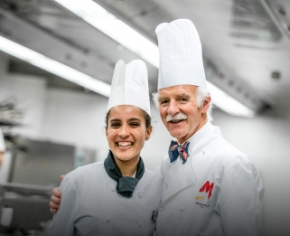- About
- Schools
- Lifelong Education
- News & Events
- Community
Culinary Arts Academy Switzerland reacts to Swiss lobster ruling
#Academics
Culinary Arts Academy Switzerland reacts to Swiss lobster ruling
The Swiss government has ruled that lobsters must be transported and stored in a natural environment rather than on ice or in ice water and must be stunned before they are cooked. The change will go into effect in March, 2018.
While the debate over the new lobster rule is ongoing, Culinary Arts Academy Switzerland will move forward by changing the way we teach how lobsters are prepped for cooking. Although there may not be consensus about the ruling across Switzerland, the school views the debate as an opportunity to further discuss animal treatment with our students.
“
As educators, we have a responsibility to inform and discuss changes in regulations, but more importantly we must always be in search of ways of delivering high quality food while being respectful of the life and death of the animals we eat.
”
We hope that this new law will encourage students and chefs to work on innovative opportunities to change the way we have been breeding, cooking and eating crustaceans. These debates are important on future food trends, and we will use it in the classroom to not only reflect on how we cook lobsters, but also how we work with other products in general.
Culinary Arts Academy strives to develop world-class culinary graduates who will lead and influence not only the food we eat - but how we eat too. We hope these types of debates continue in and beyond the culinary classroom as we should all care about how our food arrives to our plates.
 |
Tanja Florenthal is the Academic Director of César Ritz Colleges Switzerland and Culinary Arts Academy Switzerland. |
|||
About Culinary Arts Academy Switzerland
Culinary Arts Academy Switzerland is a culinary school based across two campuses, Le Bouveret and Lucerne, offering Bachelor and Master programmes with a focus on entrepreneurship. A professional diploma specialising in Swiss pastry and chocolate is also available.
#Academics


















